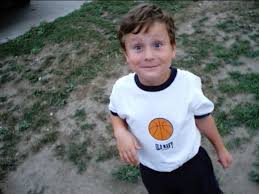An Autism Spectrum Disorder (Asperger's Syndrome)
Asperger syndrome (AS) is a neurobiological disorder that is part of a group of conditions called autism spectrum disorders. The term "autism spectrum" refers to a range of developmental disabilities that includes autism as well as other disorders with similar characteristics.
They are known as spectrum disorders because the symptoms of each can appear in different combinations and in varying degrees of severity: two children with the same diagnosis, though they may share certain patterns of behavior, can exhibit a wide range of skills and abilities.
Signs and Symptoms
These signs and symptoms might be present in a child with AS:
· inappropriate or minimal social interactions
· conversations almost always revolving around self rather than others
· "scripted," "robotic," or repetitive speech
· lack of "common sense"
· problems with reading, math, or writing skills
· obsession with complex topics such as patterns or music
· average to below-average nonverbal cognitive abilities, though verbal cognitive
abilities are usually average to above-average
· awkward movements
· odd behaviors or mannerisms
It's important to note that, unlike kids with autism, those with AS might show no delays in language development; they usually have good grammatical skills and an advanced vocabulary at an early age. However, they typically do exhibit a language disorder — they might be very literal and have trouble using language in a social context.
Often there are no obvious delays in cognitive development or in age-appropriate self-help skills such as feeding and dressing themselves. Although kids with AS can have problems with attention span and organization, and have skills that seem well developed in some areas and lacking in others, they usually have average and sometimes above-average intelligence.
What Causes Asperger Syndrome?
Researchers and mental health experts are still investigating the causes of autism and AS. Many believe that the pattern of behavior that characterizes AS may have many causes. There seems to be a hereditary component to AS, and research indicates that in some cases AS may be associated with other mental health disorders such as depression and bipolar disorder. Researchers are also looking into whether environmental factors that affect brain development might play a role.
Contrary to the incorrect assumptions some may make about people with the disorder, AS is not caused by emotional deprivation or the way a person has been brought up. Because some of the behaviors exhibited by someone with AS may be seen by others as intentionally rude, many people wrongly assume that AS is the result of bad parenting — it isn't. It's a neurobiological disorder whose causes are not yet fully understood.
Currently, there is no cure for the disorder — kids with AS become adults with AS. But many lead full and happy lives, and the likelihood of achieving this is enhanced with appropriate education, support, and resources.
Treating Asperger Syndrome
Because AS can present patterns of behaviors and problems that differ widely from child to child, there isn't a "typical" or prescribed treatment regimen. However, your child may benefit from the following forms of treatment:
· specialized educational interventions the child
· social skills training
· language therapy
· sensory integration training for younger kids, usually performed by
an occupational therapist, in which they are desensitized to stimuli
to which they're overly sensitive
· psychotherapy or behavioral/cognitive therapy for older children
· medications
In conclusion it's important to know that many people can provide assistance. Finding the right program for your child is key and getting help early is important. Kids with AS can and do experience great gains with the appropriate treatment and education.
Images:


Done by:
Ashwini
Nurul Nadirah
Emylia
No comments:
Post a Comment